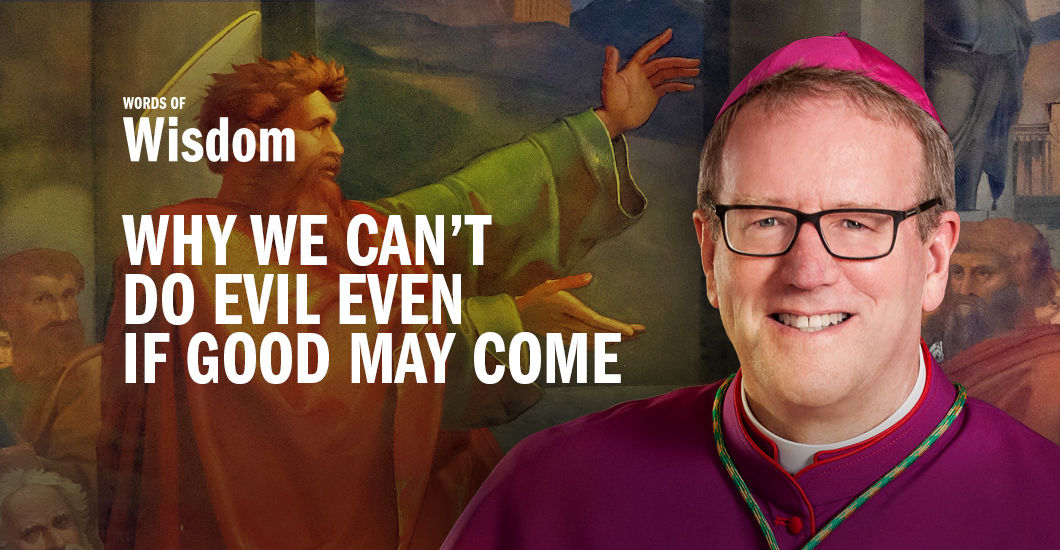Trending Articles
Why we can’t do evil even if good may come
There is a curious and intriguing passage in the third chapter of St. Paul’s letter to the Romans, which in the context of the missive seems almost tossed-off, but which has proven to be a cornerstone of Catholic moral theology for the past two thousand years. Responding to some of his critics, Paul says, “And why not say (as some people slander us by saying that we say), ‘Let us do evil that good may come?’ Their condemnation is deserved” (Rom. 3:8)! One might formulate Paul’s somewhat convoluted statement as follows: we should never do evil that good might come of it.
There are indeed truly wicked people who seem to take delight in doing evil for its own sake. Aristotle called them vicious, or in extreme cases, “beast-like.” But most of us who do bad things typically can find a justification for our behavior through appealing to a good end that we were hoping through our action to achieve. “I’m not really proud of what I did,” I might say to myself, “but at least it brought about some positive consequences.” But the Church, following the prompt of St. Paul, has consistently frowned on this manner of thinking, precisely because it opens the door to moral chaos. Concomitantly, it has recognized certain acts—slavery, adultery, the sexual abuse of children, the direct killing of the innocent, etc.—as “intrinsically evil”—which is to say, incapable of being justified through appeal to motivation, extenuating circumstances, or consequences. So far, so obvious.
But this principle has come to my mind recently, not so much in regard to the moral acts of individuals, but to the moral assumptions that seem to be guiding much of our society. I might suggest that a sea-change occurred in 1995 with the trial of O.J. Simpson. I think it’s fair to say that the overwhelming majority of reasonable people would concur that Simpson committed the terrible crimes of which he was accused, and yet he was exonerated by a jury of his peers and vehemently supported by large segments in our society. How can we explain this anomaly? The exculpation of O.J. Simpson was justified, in the minds of many, because it was seen as contributing to the solution of the great social ill of the racial profiling and persecution of African Americans by the Los Angeles police department in particular and police officers across the country in general. Allowing a guilty man to go free and allowing a gross injustice to remain unaddressed were, at the very least, tolerated, because it appeared they conduced to some greater good.
The O.J. Simpsonization of our legal thinking was on gross display much more recently in the sad case of Cardinal George Pell. Once again, given the wild implausibility of the charges and the complete lack of any corroborating evidence, reasonable people were bound to conclude that Cardinal Pell should never have been brought to trial much less convicted. And yet Pell was found guilty and sentenced to imprisonment, and a later appeal confirmed the original conviction. How could we possibly explain this disconnect? Many in Australian society, legitimately outraged at the abuse of children by priests and the subsequent cover-up by some in ecclesial authority, felt that the imprisonment of Cardinal Pell would somehow address this overarching issue. So once again, in violation of Paul’s principle, evil was done that good might come of it.
The same problem is evident in regard to sexual aggression against women. In the wake of the Harvey Weinstein situation and the subsequent #MeToo movement, no serious person doubts that numerous women have been unconscionably mistreated by powerful men and that this abuse is a cancer on the body politic. Therefore, in order to achieve the good of solving this problem, men are sometimes accused, harassed, effectively condemned without investigation or trial. To show that I have no partisan axe to grind here, I will draw attention to the treatment of both Justice Brett Kavanaugh and, in recent days, former Vice President Joe Biden. The thinking seems, again, to be that the righting of a general wrong justifies morally irresponsible behavior in particular cases.
The prevalence of this moral consequentialism in our society is supremely dangerous, for the moment we say that evil can be done for the sake of the good, we have effectively denied that there are any intrinsically evil acts, and the moment we do that, the intellectual support for our moral system gives way automatically. And then the furies come. A very instructive example of the principle is the Terror that followed the French Revolution. Since there had been (undoubtedly) tremendous injustices done to the poor by the aristocratic class in eighteenth-century France, anyone perceived to be an enemy of the revolution was, without distinction or discrimination, swept to the guillotine. If innocents died alongside the guilty, so be it—for it served the building of the new society. I believe that it is no exaggeration to say that Western society has yet fully to recover from the moral chaos visited upon us by the lethal consequentialism of that time.
Therefore, even as we legitimately fight the great social evils of our time, we must remember Paul’s simple but trenchant principle: never do evil that good might come of it.

© Bishop Robert Barron is the founder of Word on Fire Catholic Ministries and is the bishop of the Diocese of Winona–Rochester. Bishop Barron is a #1 Amazon bestselling author and has published numerous books, essays, and articles on theology and the spiritual life. ARTICLE originally published at wordonfire.org. Reprinted with permission.
Latest Articles
Want to be in the loop?
Get the latest updates from Tidings!








